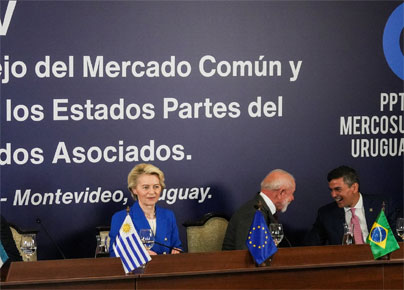Canary Islands Banana Growers Criticize EU-Mercosur Agreement
2024-12-20

Agricultural associations in the Canary Islands have labelled the treaty signed between Europe and the economic bloc of Argentina, Brazil, Paraguay, and Uruguay as a "betrayal." Producers will protest on December 16 in front of the Ministry of Agriculture.
Ruin, betrayal, or debacle are some of the terms used by Canary Islands banana producers to describe the consequences of the free trade agreement between the European Union and the Southern Common Market (Mercosur) states on the primary sector of the Islands. The deal involves an 82% reduction in tariffs applied to imports from Argentina, Brazil, Paraguay, and Uruguay. Additionally, the EU will liberalize most of the access to its market. "It will devastate the competitiveness of agriculture and livestock, products will enter without control and without tariffs, at very low prices that will be impossible to compete with," says Theo Hernando, secretary general of the Association of Farmers and Ranchers of the Canary Islands (Asaga), who laments that the agreement will deliver the "final blow" to the primary sector of the Islands.
The agricultural associations of the Archipelago believe that the negotiation particularly harms Mediterranean countries - Spain, France, and Italy - as they are the most agrarian regions of the continent. "It will ruin us, it is a real betrayal," say representatives from Asaga and COAG Canarias. The Minister of Agriculture, Livestock, Fisheries, and Food Sovereignty, Narvay Quintero, also expressed his rejection of the agreement during the plenary session yesterday due to the lack of a detailed analysis of the repercussions that the entry of new producers from third countries into the community market would have on the primary sector of the Outermost Regions (RUP).
In the case of the Canary Islands, the main concern lies in the impact the agreement may have on the banana sector, which dedicates 90% of its production to sales in mainland Spain. "If every year the Canary Islands banana was already losing market share due to competition from bananas from Latin American countries, with this measure it is over," warns Hernando.
Other island products are protected thanks to the March 12, 1987, order, which establishes phytosanitary regulations for importing, exporting, and transporting plants and plant products in the Islands. This regulation aims to prevent the entry of pests, thus prohibiting the import of certain fruits and plants. This is the case for bananas, avocados, mangoes, papayas, and tropical pineapples. Everything consumed in the Canary Islands is locally produced. There is no importation.
The Ministry of Agriculture has sent a statement clarifying that entry will continue to be controlled to ensure food safety at the border. Still, associations are deciding whether this promise has been fulfilled.
For now, France is the country that has shown the most opposition to the agreement. The Canary Islanders hope the mobilization in France will trigger a chain reaction across the rest of the continent that reaches Brussels. A protest is scheduled for December 16 in Madrid in front of the Ministry of Agriculture, and producers warn that "it will not be the only one." "The coming months are going to be heated," says Miguel López, secretary general of COAG in Tenerife.









